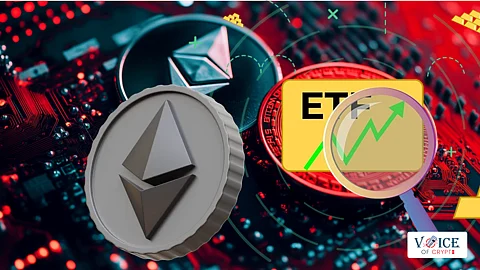

The speculation around staking in the Ethereum spot ETF market has been a hot topic in many crypto circles.
Balchunas says that ETH needs a lot more than a few good weeks for a comeback.
It needs strong momentum and a powerful narrative to drive a comeback in investor interest.
Without a strong rally according to Balchunas, it will be difficult for ETFs to attract new money.
According to Bloomberg analyst James Seyffart , approval could come before the final deadline at the end of October 2025.
The speculation around staking in the Ethereum spot ETF market has been a hot topic in many crypto circles.
Naturally, investors expect the upgrade to these ETPs to usher in a major price rally for the cryptocurrency.
However, analysts continue to warn that it might not bring the expected investor inflows unless Ethereum itself breaks out of its ongoing slump.
According to recent insights from Bloomberg ETF analyst Eric Balchunas, while staking could provide a small boost for the ETF and spot markets, it might not be enough to spark a major rally on its own.
Balchunas says that ETH needs a lot more than a few good weeks for a comeback.
It needs strong momentum and a powerful narrative to drive a comeback in investor interest.
Staking, or locking up crypto assets to earn rewards, has been a major feature in Ethereum’s ecosystem since its transition to proof-of-stake.
The idea of ETFs offering staking rewards is so appealing because it could allow institutional investors to earn passive income while gaining exposure to ETH.
However, Balchunas speaking during an episode of the New Era Finance Podcast, isn’t convinced this will move the needle in any meaningful way.
At least not yet.
Since these ETPs launched in the US in July of 2023, their performance has trailed far behind that of their Bitcoin counterparts.
While Bitcoin ETFs hit new highs just two months after going live, ETH has struggled to maintain momentum after nearly a year.
The year started on a good note, with Ethereum briefly rallying after former President Donald Trump’s election win in November.
This market-wide surge saw ETH jump 71% to nearly $4,100 by mid-December.
During this window, Ether ETFs recorded 19 straight days of inflows with around $2.44 billion coming in according to Farside data.
However, that optimism didn’t last.
Ethereum’s price has since fallen by around 56% to around $1,809 at the time of writing.
Without a strong rally according to Balchunas, it will be difficult for ETFs to attract new money.
“It needs something more than just a good week here and there,” he said.
Moreover, the poor timing of the ETF launch, right before a downtrend, didn’t help matters.
The difference in performance between Ethereum and Bitcoin ETFs further adds weight to Balchunas’ argument.
The Bitcoin ETFs were launched earlier in January of last year and quickly rode a bullish wave over $95,000.
That kind of rally naturally attracted investor attention and money.
Ethereum, on the other hand, stumbled right out of the gate. “When you launch an ETF and you have that sort of performance out of the gate, it’s tough,” Balchunas noted.
This has led to the implication: Even with staking added into the mix, Ethereum ETFs won’t see major gains unless the asset itself starts performing better.
While the idea of staking in ETFs sounds promising, there are more than a few barriers to this.
Chief of these is regulatory approval.
The U.S. Securities and Exchange Commission hasn’t yet given the green light for issuers to include staking in their offerings.
According to Bloomberg analyst James Seyffart , approval could come before the final deadline at the end of October 2025.
While Intermediate decisions may arrive as early as late May or August, the timeline is still highly undefined.
Without SEC approval, ETF issuers can’t offer the staking rewards that could make their products more attractive.
Even if approved, nobody knows how much of an effect staking will have without a more favorable market environment.
Disclaimer: Voice of Crypto aims to deliver accurate and up-to-date information, but it will not be responsible for any missing facts or inaccurate information. Cryptocurrencies are highly volatile financial assets, so research and make your own financial decisions.